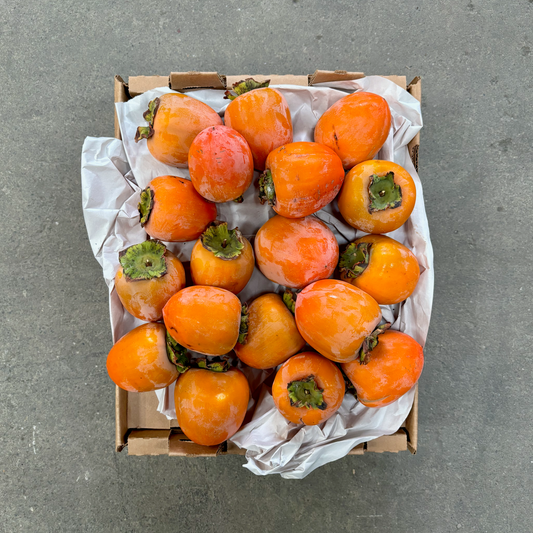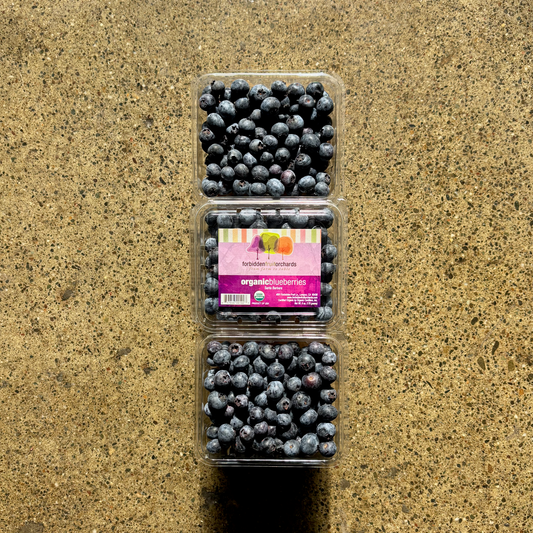fruit notes
Fresh this week
Last week was our first week with Hayley and Jesse’s peaches, but we didn’t get to give them a proper introduction. Hayley and Jesse both have over a decade of experience in organic farming, specifically in mixed veg and flowers. They recently took over at Double Wild Farm in Oroville. You may know this farm as Peach Jamboree under the care of Danny and Drew, or prior to that as Woodleaf Farm under Carl Rosato. Carl started Woodleaf in 1980, which was the ninth farm in California to be certified organic by CCOF! We knew Danny and Drew were looking to retire and had been seeking someone to hand off the farm to. A few months ago, when we found out that the farm was going to the loving hands of Hayley and Jesse, we were beaming with joy! Change is hard and this has been no different. Besides learning a new crop and adapting to a new growing region, wildfire threatened the farm just a few months into their transition. In July, the Thompson Fire burned within a few miles of the property, but thanks to CalFire and favorable winds, the farm emerged unscathed. We are in awe of Hayley and Jesse’s resilience and passion, and we can’t wait for some of our fave peach varieties to come from this beautiful Northern California orchard. This week, we’ve got Hayley’s favorite peach: Summer Zee yellow peaches. It has beautiful blush, a freestone, and nice acidity. It’s a late-summer winner! Store these on the counter. Grown organically by Double Wild Farm in Oroville.
During the warm season, figs set two crops of fruit. The first figs appear in late spring when trees are just starting to leaf out, known as the breba crop. Breba crop figs are the ultimate tease: the figs are bigger, less abundant, and not as flavorful compared to the main crop. But still, it’s hard to resist! Main crop figs are NOW and they are really popping off in warm inland areas like Winters and the Capay Valley. Toby at Free Spirit Farm grows a few trees of each fig variety: Black Mission, Brown Turkey, and Candy Stripe. He pushes ripeness and doesn’t harvest them until they are super jammy and sweet. It’s amazing that the birds haven’t gotten to them first. Lucky us! Store your figs in the fridge. Grown organically by Free Spirit Farm in Winters.
We’ve known this experimental grape variety as IFG 37 for the last few years. This year it’s all grown up and ready for its debut. The creative geniuses at the grape breeding firm have anointed it thusly: Funny Fingers™. Name aside, these grapes are some of our favorites from Murray Family Farm. They’re tasty and the elongated shape is in fact fun! Murray grows two kinds of green finger grapes and this one is significantly more delicate. The grapes narrow at the tip, which is the first to ripen – it’s the sweetest part! – so it can bruise easily. But the flavor of this variety is amazing! It has a lovely muscat flavor with sweet honey notes and a floral background that kind of reminds us of lemon verbena. Murray Family Farms grows so many fun grape varieties with a focus on flavor. Store your grapes in the fridge. Grown organically by Murray Family Farms in Bakersfield.
Albion strawberries are some of the first (and most frequent) strawberries to be seen at markets in the spring, but I think they’re at their best right now. In the spring, they are big, abundant, and quite firm. In the peak of summer with the roller coaster of heatwaves, they’re colored fully red and beautiful, with an intoxicating aroma. (They taste like the plants just persevered through a heatwave – do you get that flavor or just me?) With heatwaves subdued, the temperatures are optimal for consistent ripening and flavor development. Now, Poli Yerena’s Albion strawberries are deeply flavorful, a bit more tender than the early season berries, and oh-so-sweet. Store your berries in the fridge. Grown organically by Yerena Farms in Watsonville.
We were planning to include another round of Dapple Dandy pluots, but we made a last minute switch! Toby let us know the Emerald Beaut plums were ready and we have such a soft spot for green-skinned plums. Emerald Beaut plums are unlike their earlier season counterparts, as they eat more like a pluot. They’re freestone, sweet, and full of flavor while remaining crisp and crunchy (for all your pluot lovers out there). They can hang onto the tree for a while, into September, if the birds will share. If you prefer them with a little softer flesh, leave them on the counter for 1-2 days to your liking but they’re ripe and ready to enjoy as-is. Store on the counter. Grown organically by Free Spirit Farm in Winters.
For a late-season nectarine, the Viking Pearl white nectarine is a bit troublesome because of its fragile, too-delicate-for-this-world skin and its clingstone pit. But its ivory flesh and sub-acid flavor is just a quintessential white nectarine! Behind the soft skin is a juicy and sweet nectarine that’s waiting to be eaten – ideally right off the tree. Spots where the nectarine may have rubbed shoulders with a branch, another fruit, even a leaf with an independent streak (nothing wrong with that, hello to my grade school teachers!) – they all spell trouble. Which is why these Viking Pearl white nectarines are unfavorable for shipping, storing, and the commercial market. Enjoy these soon and store them in the fridge since they’re so delicate. Grown organically by Blossom Bluff Orchards in Parlier.
Encore appearances
Thea and Andres of Gauchito Hill Farm grow some of the most delicious fruit on their farm in the Capay Valley. In particular, we love their figs and blackberries. We’ve seen a tough blackberry season this year for many growers, especially with intense heat waves affecting flavor, and humidity and extreme temperature variation causing unevening ripening evidenced by red cells. Gauchito is limited with their blackberries right now, too, but they’re harvesting a special bit of Prime Ark blackberries for this fruity fan club. This year, we’re feeling extra grateful for any blackberries we can get in August. Store your berries in the fridge. Grown organically by Gauchito Hill Farm in the Capay Valley.





